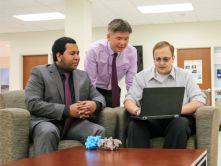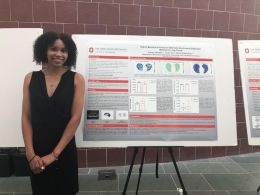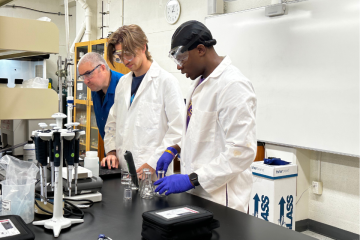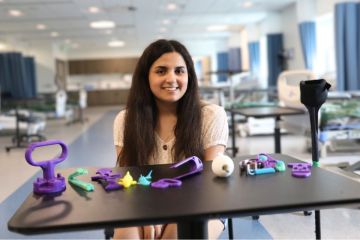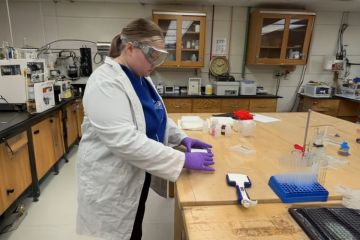Teaming Up to Treat COVID

The arrival of the COVID-19 pandemic has left the global science and medical community in a race to understand the virus’ origins, causes, and transmission. Limited knowledge about the virus and its rapid development underscores a need for a treatment.
An interdisciplinary research team led by Sachin Patil, professor of chemical engineering, published a meaningful discovery in direct response to the global crisis. The team’s work is part of worldwide efforts to find an effective treatment option.
“COVID-19 has significantly affected the entire world, including our own lab’s primary research work in cancer immunotherapy,” said Patil. “Due to this, we decided to investigate if we can contribute to the ongoing race of finding effective therapeutics against this pandemic.”
The team’s findings identified a series of small molecule drugs with the capacity to be repurposed to target a key interaction between coronavirus carrying protein, SARS-CoV-2, and the protein that enables the virus to infect the body. That is known as the angiotensin-converting enzyme 2 or ACE2.
The research used proven methods developed by Patil in Widener’s NanoBio Lab, which immediately prior to pandemic’s outbreak focused on investigating FDA-approved small molecule drugs for cancer treatments. When COVID hit, they redirected their work toward the virus, intent on using their scientific knowledge, and the lab tools, to help make a difference in the fight against the devastating illness.
We are using the similar approach to discover drug-like molecules to target a critical protein-protein interaction that COVID-19 virus makes with a host protein, ACE2, expressed on human lung and heart. —Professor Sachin Patil
If shown to be effective, the identified drugs, some of which had proven activity against respiratory diseases, may present much-needed immediate clinical potential against COVID-19.
Agility in the lab allowed Patil and his team to pivot from their cancer research and align with the growing demand for a drug treatment to fight COVID. This temporary adjustment has also taught students the value of having adaptable skills and how they can be applied in various ways to help solve real-world public health dilemmas.
To assist with the investigation, Patil recruited a team of student-researchers as well as alumnus Jeremy Hofer ’18, who participated in various research projects in the NanoBio Lab while a computer science undergraduate.
The pandemic’s arrival gave us another opportunity to apply the same methodologies and data processing pipeline that we set up for the cancer research, and apply it all to researching COVID-19. —Jeremy Hofer '18
Working remotely, the researchers simulated virtual docking sequences between SARS-CoV-2 and ACE2 using large databases available within the drug processing and drug discovery field. They then ranked and scored the drugs that presented high binding potential against the interaction.
Hofer, who now works as a senior associate software engineer at Capital One, led all computational aspects of the research including executing the data processing pipeline and analysis. Utilizing the computer science skills developed at Widener, Hofer executed the drug processing across industry software in a parallel manner, which rapidly accelerated the timeline.
“Instead of processing one at a time, we are able to process hundreds,” Hofer said, explaining how the technology helps speed the research work.
While Hofer brought years of research background to the project, the timely study was a new experience for 4+1 biomedical engineering student Autumn Campbell.
The opportunity allowed Campbell, who plans to pursue a career in the pharmaceutical industry, in-depth exploration of disciplines outside of biomedical engineering, such as organic chemistry, chemical structures, and reagent reactions.
It opened up my scope between biomedical and chemical engineering. —Autumn Campbell '21
Campbell, a senior, is well versed in faculty-student research but new to the NanoBio Lab. She couldn’t turn down the opportunity for interdisciplinary collaboration, noting it was especially valuable because so little information is known about COVID-19 and its impact.
Whether it is COVID-19 or cancer immunotherapy, partnering with faculty on research puts Widener students at the forefront of some of the most challenging problems in the world today. Perhaps more important as Campbell noted, it gives students the skills to excel, and to lead in the fields they are preparing to enter.
“There’s always a need for innovation, in any field, but especially in science. If you’re in science, you need to innovate,” said Campbell.
Explore Widener's Engineering Program

